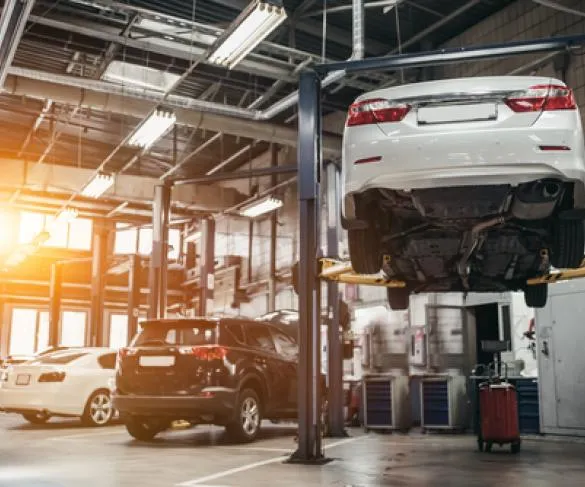They say prevention is better than a cure, and that applies to insurance. It’s always a better idea to prevent an accident happening in the workshop, than to make a claim, whether you are a mechanic, repairer, or auto electrician.
We take a look at some of the dos and don’ts in the workshop below:
Slips and trips
Do keep the workplace tidy – clear away tools, used items and airlines after use.
Do provide non-slip floor surfaces. Clear up spillages immediately and repair flooring damage.
Do provide slip-resistant footwear when necessary.
Do ensure that snow, ice or water from vehicles is cleaned up.
Don’t ignore spillages caused by others.
Plant and equipment
Do ensure that all equipment is installed, used, regularly inspected and maintained as recommended by the manufacturer.
Do train people to use equipment and machinery correctly.
Do buy and use reduced-vibration tools wherever possible and maintain them.
Don’t use machines and equipment unless the correct safeguards are in position (e.g. guards and rests on grinding wheels, chuck and drill guards on pedestal drills, drive belts guarded on compressors, toe protection on vehicle lifts, and original specification support pins on axle stands).
Don’t use any vehicle lifts, lifting plant/equipment or compressors unless they have a valid certificate of inspection and thorough examination from a competent person.
Manual handling
Do consult the workforce because they will be familiar with handling problems and may have practical solutions to them.
Do provide mechanical aids where appropriate, eg engine hoists, trolleys for tyres and gas cylinders, and train people to use them correctly.
Do encourage staff to ask others to help them with awkward or heavy loads.
Don’t let people struggle.
Falls
Do take appropriate precautions to stop people falling into pits.
Do provide suitable access for work at height.
Do check ladders, steps, platforms and scaffolding – record your findings.
Don’t use ladders that are unsecured or on uneven/unstable ground. Don’t allow people to climb racking to get parts.
Don’t use faulty access equipment – get it repaired or replaced.
Transport
Do keep vehicles and pedestrians apart, provide safe parking for customers and reduce the need for reversing.
Do provide an adequate number of traffic routes, of sufficient width and headroom, to allow people and vehicles to circulate safely with ease.
Do make a plan of the work area – identify parking and loading areas and directions of travel.
Don’t leave vehicles unbraked or unchocked, e.g. when on vehicle lifts or sloping ground.
Don’t start the engine from outside the vehicle. Always start vehicles from the driver’s seat with both feet inside and the gear disengaged.
Fire and explosion
Do use a proprietary fuel retriever/adaptor when draining petrol from tanks and lines – make sure the vehicle and the retriever are both earthed.
Do keep the tops/lids on containers of highly flammable liquids.
Do store containers of highly flammable liquids in a safe place, in the open air or in a suitable storeroom.
Do fit flashback arresters to both the fuel and oxygen gas cylinder regulators. For longer lengths of hose, also fit them to the blowpipe.
Do store gas cylinders in a safe, well-ventilated space, preferably outside.
Don’t drain petrol over, or close to, a pit or drain.
Don’t smoke, weld or carry out other hot work while removing petrol.
Don’t store more than 50 litres of highly flammable liquids in the workroom.
Don’t spray highly flammable liquid paints in the open workshop or where there is a risk of fire/explosion.
Don’t use petrol/solvents to burn rubbish.
Don’t carry out hot work before removing or shielding items that may be affected.
Electrical safety
Do have the fixed electrical system checked (recommended at least every five years) by a competent electrician and keep records of the results.
Do use air-tools or cordless or low-voltage (110 v or 50 v) equipment wherever possible.
Do use residual current device (RCD) protection for each electrical socket.
Do visually check portable tools, e.g. hand lamps, drills and grinders, before use and have them tested regularly by a competent person.
Don’t use a pressure washer without an RCD or earth-monitoring device, which should be tested every day.
Skin disease
Do use the right type of disposable glove to keep the hands clean, e.g. nitrile for oils and grease.
Do make sure washing facilities have running hot and cold or warm water, soap and clean towels or other means of cleaning or drying.
Do provide dispensers for pre-work creams, cleansers and after-work creams so workers will be more likely to use them.
Don’t use cleaners that are too strong as these can damage the skin.
The information provided is intended to be a guide only.
To discuss you own requirements, contact the Road Runner insurance team on 0330 100 8720

